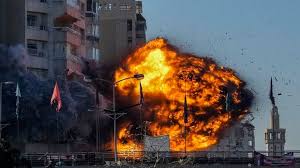First round of Gaza ceasefire talks between Israel-Hamas ends inconclusively

Gaza Ceasefire Talks Begin in Doha but End Without Breakthrough
The first round of ceasefire negotiations between Israel and Hamas ended without agreement in Doha, Qatar, on Sunday. Mediators had hoped for progress, but the talks stalled due to major disagreements and limited authority on the Israeli side.
Talks Open with Hope, Close with Uncertainty
Qatar and Egypt hosted the indirect discussions, with backing from the United States. The goal was to build on a proposal supported by President Donald Trump’s administration. However, the Israeli team reportedly lacked the authority to approve any binding decisions.
“They came to talk, not to agree,” a Palestinian official said, requesting anonymity.
This lack of decision-making power blocked progress on key points. These include the withdrawal of Israeli troops, reopening the Rafah crossing, and allowing humanitarian aid into Gaza.
Hamas Demands Remain Unchanged
Hamas remained open to talks but held firm on its demands. The group wants a full ceasefire, troop withdrawal, the return of displaced Palestinians, and unrestricted aid access.
Although Hamas showed interest in the U.S.-backed proposal, they still want firm guarantees. A Qatari diplomat noted, “Hamas fears delays or limits disguised as security controls.”
Israelis Demand Hostage Release
In Israel, pressure on Prime Minister Benjamin Netanyahu continues to grow. Over the weekend, tens of thousands gathered in Tel Aviv and other cities. Protesters demanded a ceasefire and the release of hostages held in Gaza.
About 50 hostages remain, though only around 20 are believed to be alive, according to Israeli intelligence.
Opposition leaders criticized Netanyahu’s slow response. Yair Lapid said, “Every delay puts lives at risk.”
Many families believe only a ceasefire can bring their loved ones home.
Humanitarian Crisis Escalates
In Gaza, the situation worsens by the day. Aid groups report severe shortages of food, water, and medicine. More than 80% of the population has been displaced, and infrastructure lies in ruins.
“The crisis is catastrophic,” said the UN Humanitarian Coordinator for Palestine. “People need urgent relief.”
Hospitals run on generators and lack basic supplies. Sanitation is poor, and diseases are spreading in crowded shelters.
Trump and Netanyahu to Meet
Attention now turns to Washington, where Netanyahu will meet President Trump later this week. Trump believes a deal could happen soon.
“There’s a good chance of a deal this week,” Trump told reporters. “We could see quite a few hostages released.”
Analysts expect Trump to push Netanyahu for more flexibility. With the U.S. election approaching, the White House wants to avoid another escalation.
What Comes Next?
Despite the failure of the first round, both sides plan to continue. Mediators will hold separate talks in the coming days to narrow the gaps.
Still, deep mistrust and hardline positions remain. Without a clear shift, the next round could end the same way.
Final Thoughts
The talks in Doha offered a rare chance for progress, but hopes faded quickly. As both sides dig in, civilians continue to suffer.
The world watches and waits. Will leaders choose diplomacy, or will violence continue to define Gaza’s future?






